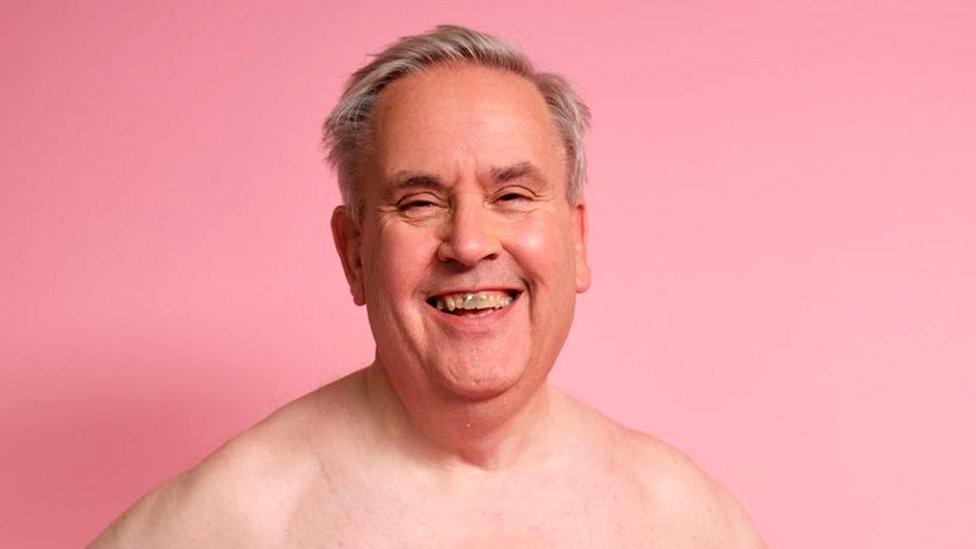Breast cancer: Living life after treatment
- Published
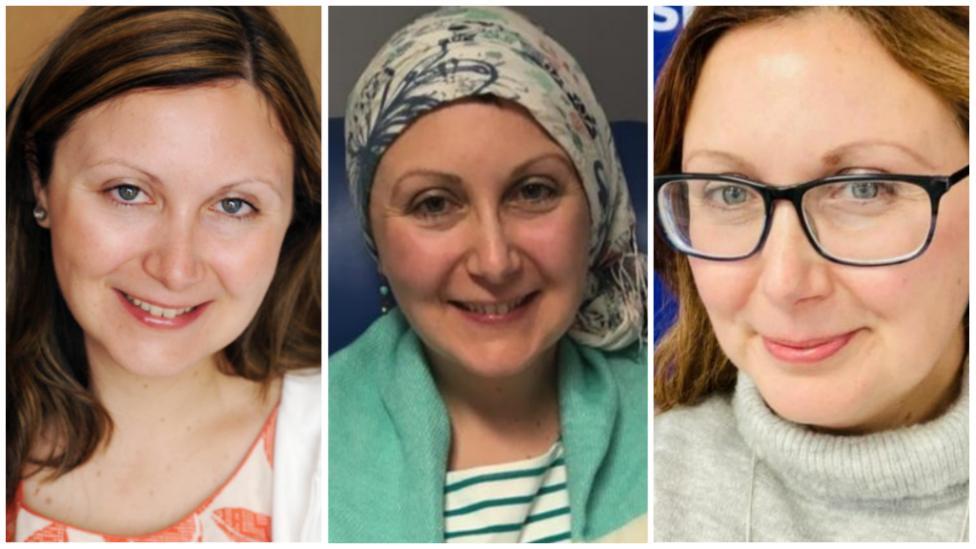
Carly was diagnosed with breast cancer in 2017. Six years later she is not yet finished with her treatment
BBC news editor Carly Appleby was diagnosed with stage three breast cancer in 2017. At that time, she had no idea how gruelling treatment was going to be. Now looking back - and to the future - she reflects on how it has changed her life.
If you had told me six years ago I still would not be finished with my cancer treatment by now, I wouldn't have believed you.
I was 37 when I was diagnosed and as a young mum I was mainly concerned with staying alive for my then three-year-old daughter and my husband.
Now, after years of hospital appointments and treatments, I no longer look sick, but this does not mean everything is ok and back to "normal".
At 43, my body thinks I am a women much older than I am.
I still suffer from fatigue and aches and pains that wake me up at night and my memory is terrible.
The veins in my arm will never return to normal after chemotherapy and it is a painful struggle to get a cannula into my veins after years of treatment.
But I feel proud of everything I have overcome with the support of my family and friends and it has made me realise how remarkable our bodies can be.
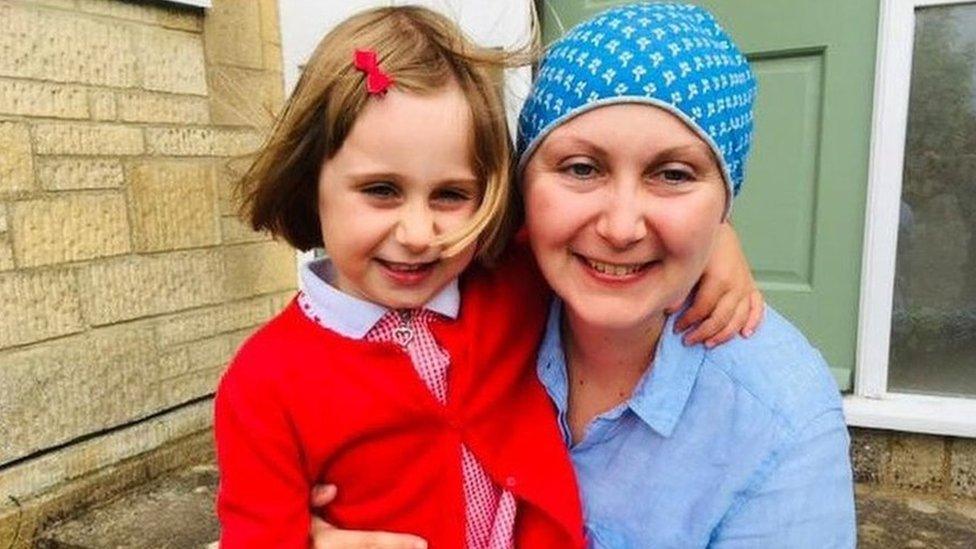
Carly and her daughter, who was three when she was diagnosed with cancer
My daughter is now nearly 10 and I hope to be able to see her grow up.
Every year that passes is a privilege and I will never take my current good health for granted.
'No idea'
It had been a beautiful day in the Cotswolds when I got my diagnosis and my husband and I were stunned. We had no idea what was to come.
Cancer treatment was not quick for me.
It included six rounds of chemotherapy, 15 sessions of daily radiotherapy, a year of targeted therapy of the wonder drug Herceptin, 18 months of injections into my stomach of Zoladex; multiple breast operations, reconstructions and surgery to remove my ovaries.
This all led to two years of hair loss and being plunged into surgical menopause.
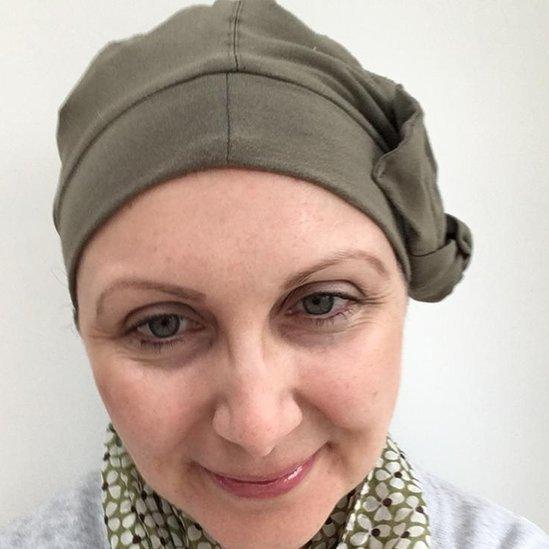
Carly wants there to be better awareness about the disease
I also take a Tamoxifen tablet daily, and will do so for four more years. It is used to lower the risk of early breast cancer coming back.
When I first got cancer, I did not know the disease would prevent me from having more children.
I still feel incredible sadness about having that choice taken away from me. We had wanted another child to complete our family and that will never be possible.
I did not have the chance to freeze my eggs because my cancer treatment needed to start immediately and according to the fertility doctor we were referred to - the process would have been contributed to my cancer growing.
It still hurts when people ask me if I only have one child. But I feel so grateful for my daughter and the opportunity to be a mum.
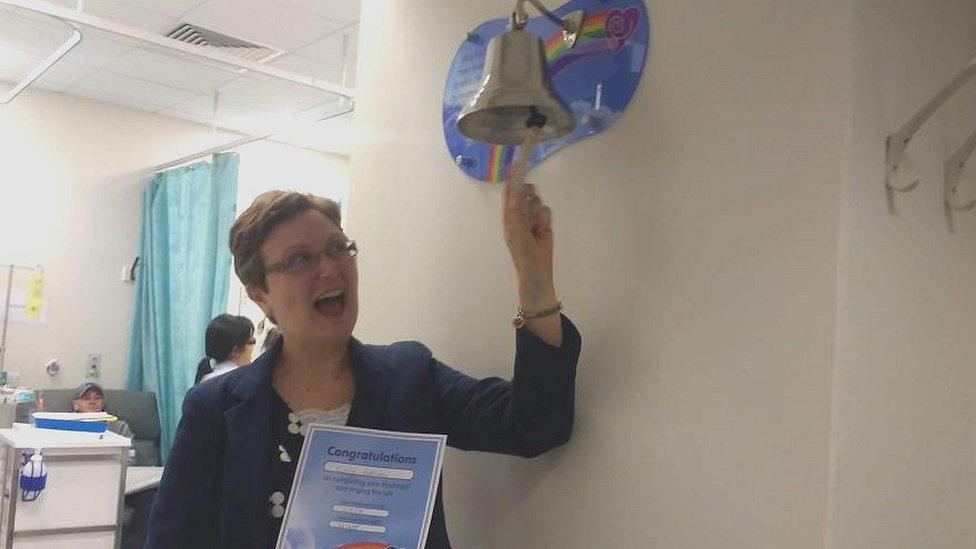
Carly ringing the end-of-treatment bell
Now she is older she has stopped asking me why she does not have a brother or sister. I feel guilty I could not provide this for my husband and little girl.
But I am still alive and in remission which means I no longer have cancer - or "no evidence of disease" - a term oncologists prefer to use.
I know I am extremely lucky. It is no longer the first thing I think about in the morning or the last thing I think about before going to sleep at night.
'Not pink and fluffy'
However the fear of cancer returning, becoming incurable and going through active treatments of chemo and radiotherapy again never goes away.
I have lost many young friends to the disease and it is hard not to make comparisons. So what have I learned?
It may be the most common cancer worldwide but breast cancer is not pink and fluffy or the "easy cancer" to be diagnosed with. There needs to be better awareness.
There are around 56,000 new cases of breast cancer every year in the UK - more than 150 cases every day.
More than 11,000 women die from breast cancer each year. Men can also get breast cancer although the numbers are far lower.

How to check your breasts
Relax - know what's normal for you and check your breasts once a month
The best time to check is in the shower with soapy hands
Take a good look in the mirror beforehand and look for any obvious lumps, skin changes, nipple changes or discharge
Remember to check your armpits
Be aware that young women especially can have lumpy breasts which are entirely normal
Breasts can change depending on menstrual cycle but if a lump persists for more than one cycle, see your GP

I no longer have regular appointments, only annual mammograms on my good breast.
Some well-meaning people would tell me about colleagues or friends they knew who had breast cancer in the past and survived.
These stories are good to hear but really they are meaningless because no diagnosis is exactly the same.
Sometimes I was too exhausted to explain that.
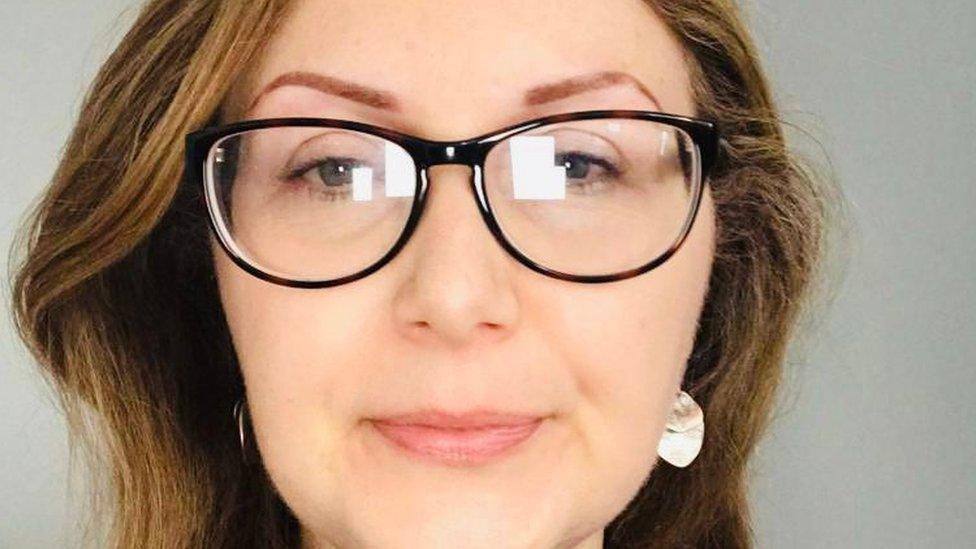
Carly had eyebrows tattooed last year which she said helped give her more confidence
Life after cancer is tricky and brings its own challenges. Many people live with pain and side effects from treatment.
Depression, anxiety, fatigue, weight gain, loss of confidence and sleep issues are common and I experienced all of these.
Lack of confidence is a huge factor and many people do not recognise their bodies after treatment. For some women this can be particularly hard.
My eyebrows never returned so I had them tattooed, and my breast cancer nurse was brilliant at tattooing a fake but extremely realistic 3D nipple. Both of these made me feel better.
'Extremely lonely'
I remember feeling both confused and amused by all of the different colours of inks - bottles of pinks, creams and browns.
Halfway through the procedure I started to feel the needles on my numb chest. The nurse asked me if I wanted to continue?
I laughed and said: "You can't leave me with a circle half coloured in, so yes please".
The other thing I quickly realised was cancer can be extremely lonely.
I felt out of place as the young mum in the playground with cancer despite having incredible support from friends and family. You stick out when you have no hair and you look ill.
Despite the many kindnesses we were regularly shown by people, unless you are going through treatment it is hard to understand how scary and stressful the process is - wondering constantly if you are going to live and make it.
You also feel like you cannot do the things you enjoy because physically and mentally you are not able to.
Our world became very small in an attempt to protect me from infection. I was shielding at home well before the pandemic hit.
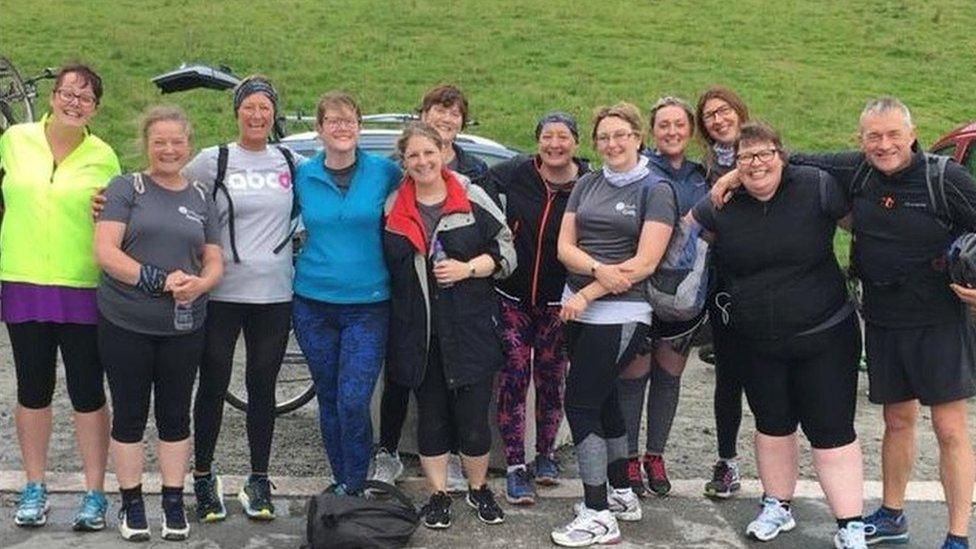
Carly attended Jo Taylor's breast cancer retreat in Saddleworth
It is hard to know what is normal after cancer, so I attended a brilliant Where Now? course run by the cancer charity Maggie's, to talk about life after treatment.
It was so helpful to meet people who had different types of cancer but were all dealing with similar issues.
We also did some Nordic walking, which can be particularly beneficial to women who have had breast cancer.
Family and friends may expect you to be able to get back to how you were before treatment, but for some people the fear of cancer and death can be overwhelming.
I did not know many women diagnosed under 40 so I sought out people who understood.
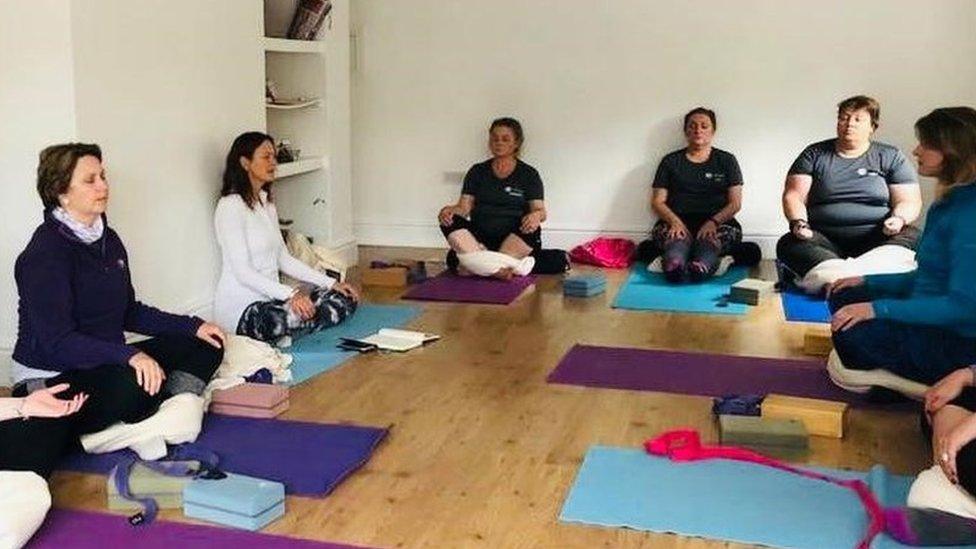
The ABCDiagnosis breast cancer retreat encourages holistic therapies and peer support
I also attended an ABCDiagnosis cancer retreat. It is run by the incredible Jo Taylor, who has been living with incurable secondary breast cancer and raises awareness through her website and campaigning.
The retreat encourages exercise, holistic therapies and peer support and I am still in touch with many of the women I met there.
I also gain support as a member of the Younger Breast Cancer Network on Facebook.
Reflecting on all I have been through, my cancer diagnosis has made me a stronger person. I am able to cope with pretty much anything.
Living with a serious life-limiting illness makes you realise just how precious and short life is.

Follow BBC West on Facebook, external, Twitter, external and Instagram, external. Send your story ideas to: bristol@bbc.co.uk , external
Related topics
- Published5 February 2023
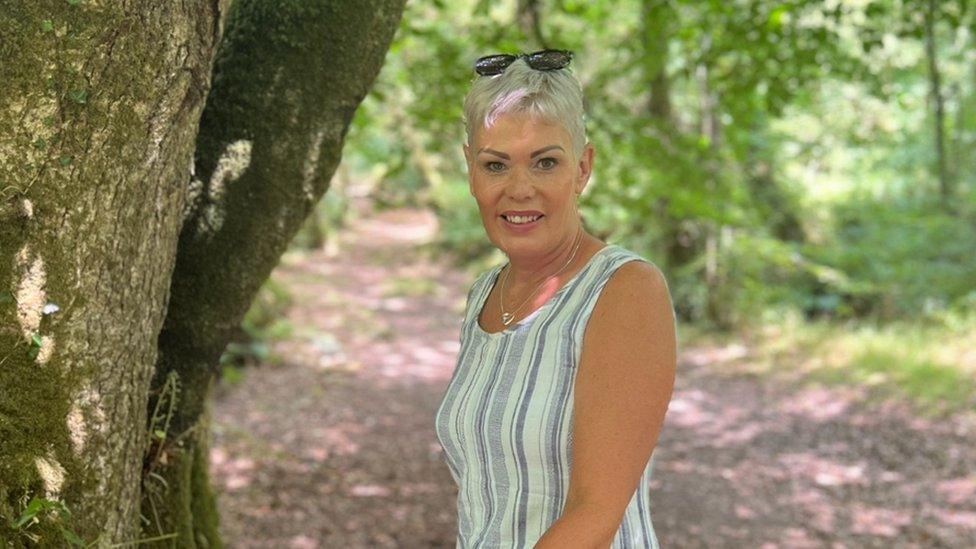
- Published4 February 2023
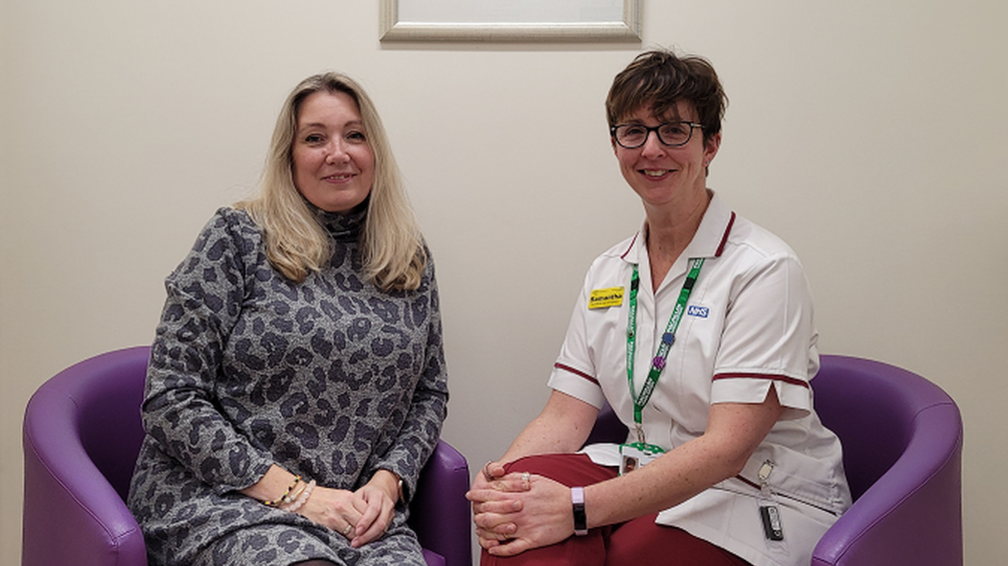
- Published6 January 2023
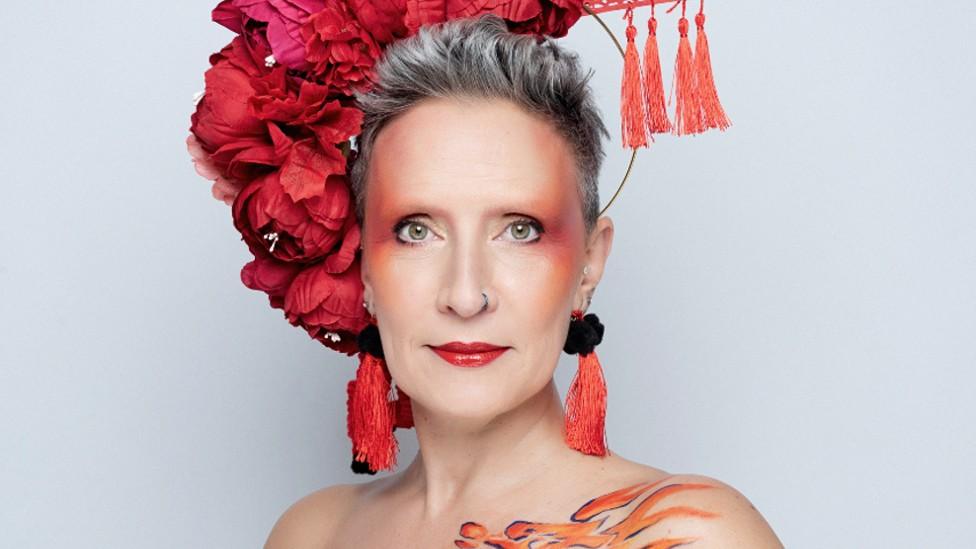
- Published10 November 2022
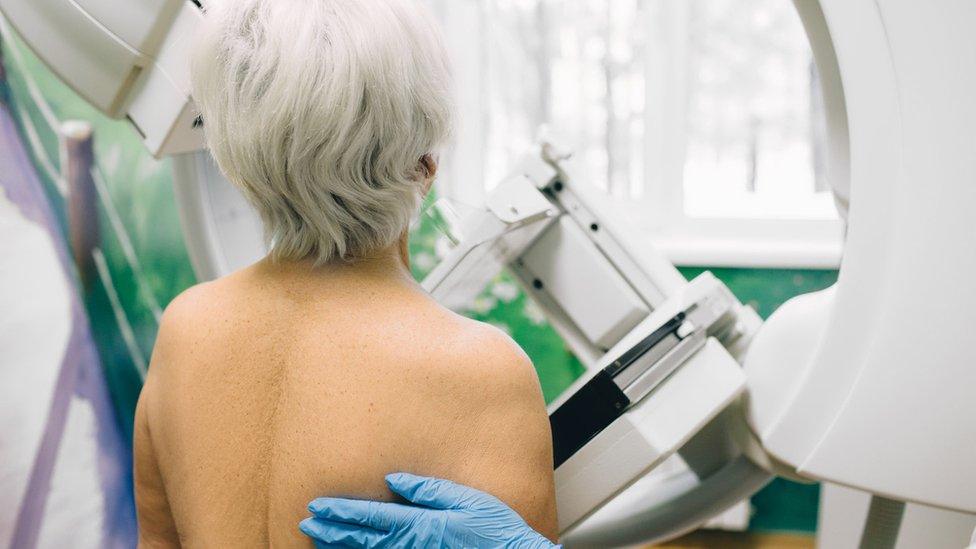
- Published6 October 2022
